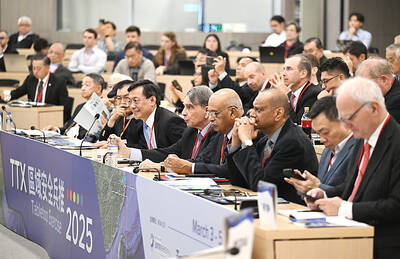Taipei City’s Maokong Gondola system, a major municipal project under former Taipei mayor Ma Ying-jeou’s (馬英九) administration, has become a thorny problem for the Taipei City Government as it scrambles to find an alternative site for the system after its route was damaged by erosion.
Taipei Mayor Hau Lung-bin (郝龍斌) refused to finalize a decision on relocating the gondola and slammed critics for staging the “political murder” of the system. However, Taipei City councilors across party lines and experts urged Ma and Hau to take political and administrative responsibility for the problematic system.
“The area where the system was built was known for its rainy weather and sensitive soil, and yet the city government went ahead and proceeded with the construction. The decisionmakers should take full responsibility for what happened,” Democratic Progressive Party (DPP) Taipei City Councilor Chuang Ruei-hsiung (莊瑞雄) said.
DPP Taipei City Councilor Hsu Chia-ching (徐佳青) condemned the then-Ma administration for dodging an environmental impact assessment (EIA) for the project by defining the system as a “recreational facility” instead of a “public transportation tool” when applying for the construction permit in 2005.
The city government tampered with the purpose of the gondola project to dodge an EIA and related construction regulations, and ignored calls by local residents and environmental groups for water and land conservation plans before construction.
“There have been warnings about the safety of the gondola, but the city government would not listen. The disasters could have been prevented if it had taken the warnings seriously,” she said.
The Maokong Gondola, located in Muzha (木柵), was Taipei City’s first cable car system and was built under Ma’s administration to develop tourism.
Ma proposed the project in 2004, and formed a special task force to carry out the plan. Construction began in 2005 and was complete in just over one year in 2006 with no EIAs or construction licenses.
The line, which cost the city more than NT$1.3 billion (US$39.3 million) to build, became a popular attraction since its opening in July last year. However, mudslides brought by a typhoon in September caused erosion under the system’s Tower No. 16 and forced the city government to suspend service since October.
Geological and engineering experts blamed the erosion of Tower No. 16 and allegedly nine other support pillars on the city government’s failure to complete an EIA and land conservation work before the construction.
“If the city government had not dodged the EIA and rushed the construction, none of these problems would have happened. President Ma Ying-jeou should take the responsibility for the decisions he made,” said Yang Ping-shih (楊平世), a bioresources and agricultural professor at National Taiwan University.
Yang, who was invited by the city government to give advice during the planning stage, said he had called on the city government to conduct EIAs and warned about the system’s negative impact on local residential area, but the city government insisted on building the gondola at the current site.
Chen Wen-shan (陳文山), a geology professor at National Taiwan University, warned that at least six more of the gondola’s 25 support pillars were built on areas prone to landslides, and would be further eroded during rainy seasons or earthquakes.
Chen Teh-yao (陳德耀), an architect who has been living in the residential community near the area for more than 30 years, said local residents and experts had also warned the city government about building the system on the current site during a public hearing in 2005.
Officials from the Taipei City’s Department of Transportation, including deputy commissioner Lin Li-yu (林麗玉), however, insisted during the hearing that the system would not produce too much noise or threaten residents’ safety.
“It turned out that the noise of the system drove us crazy and the mudslides almost ruined our houses,” he said.
Even civil engineering experts invited by the Hau administration to conduct an evaluation report on the damaged pillar concluded that Tower No. 16 was built in a sensitive area that should not be developed at all, and that the pillar should be relocated.
Despite vowing repeatedly to respect professional opinion, Hau failed to give any positive response after the full evaluation report was released on Friday.
Yang Hsiao-tung (羊曉東), spokesman for the Taipei City Government, said the city government was already searching for alternative sites for the pillar, but it had not abandoned the possibility of rebuilding the pillar at its current site.
Taipei City’s Department of Government Ethics was also conducting an investigation into the responsibility city officials bore in the construction of the gondola, but department officials acknowledged that they had no authority to investigate Ma.
Taipei’s Department of Economic Development said repair work of the damaged pillar alone cost NT$50 million, and the city government still needs to pay a monthly maintenance fee of NT$10 million while the operation has been suspended.
Both Chinese Nationalist Party (KMT) and DPP councilors urged the city government to finalize its decision on the future of the gondola immediately and stop wasting municipal funds.
Yang said the city government’s goal was to resume the gondola’s operation, but there would be no timetable as to when the service would reopen to the public.

Actor Darren Wang (王大陸) was questioned by prosecutors for allegedly orchestrating an attack on a taxi driver after he was allegedly driven on a longer than necessary route in a car he disliked. The questioning at the New Taipei City District Prosecutors’ Office was ongoing as of press time last night. Police have recommended charges of attempted murder. The legally embattled actor — known for his role in the coming-of-age film Our Times (我的少女時代) — is under a separate investigation for allegedly using fake medical documents to evade mandatory military service. According to local media reports, police said Wang earlier last year ordered a

President William Lai (賴清德) should protect Taiwan Semiconductor Manufacturing Co (TSMC), and stop supporting domestic strife and discord, former president Ma Ying-jeou (馬英九) wrote on Facebook yesterday. US President Donald Trump and TSMC on Monday jointly announced that the company would invest an additional US$100 billion over the next few years to expand its semiconductor manufacturing operations in the US. The TSMC plans have promoted concern in Taiwan that it would effectively lead to the chipmaking giant becoming Americanized. The Lai administration lacks tangible policies to address concerns that Taiwan might follow in Ukraine’s footsteps, Ma wrote. Instead, it seems to think it could

A man in Tainan has been cleared on charges of public insult after giving the middle finger during a road rage incident, as judges deemed the gesture was made “briefly to express negative feelings.” In last week’s ruling at the High Court’s Tainan branch, judges acquitted a driver, surnamed Cheng (程), for an incident along Tainan’s Nanmen Road in September 2023, when Cheng had spotted a place to park his car in an adjacent lane. Cheng slowed down his vehicle to go into reverse, to back into the parking spot, but the car behind followed too closely, as its driver thought Cheng

DEFENSE: The purpose of the exercises is to identify strategies for the government to control risks during tensions, prevent war and bolster national resilience A tabletop exercise series has begun simulating possible scenarios if the Chinese People’s Liberation Army (PLA) launched a war against Taiwan in the guise of a military exercise. The exercise series is jointly organized by National Chengchi University’s Institute of International Relations, Taiwan Center for Security Studies and Asia-Pacific Policy Research Association. Chinese Nationalist Party (KMT) Legislator Chen Yeong-kang (陳永康), former American Institute in Taiwan (AIT) director William Stanton and Taiwan Center for Security Studies director Liu Fu-kuo (劉復國) attended the event in Taipei yesterday. Scenarios that would be simulated include changing political circumstances in the US during US President Donald Trump’s tenure